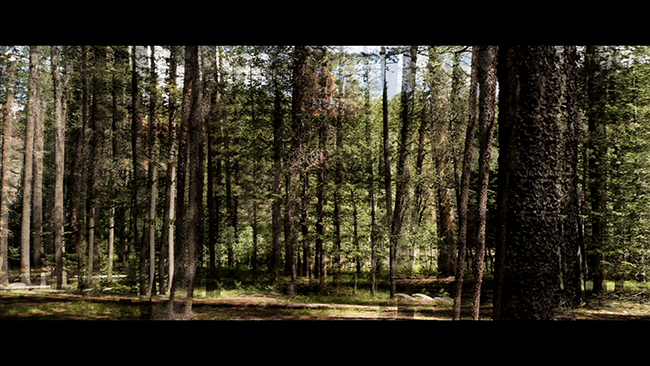by Keith Banner
The basement space at the Weston Art Gallery has always felt claustrophobic and a little spooky to me, like a staged scene in a really serious movie about abduction, no matter what art goes on the walls. It’s the ceiling that does it, kind of looming over the whole area like a grim cloud. Charles Woodman’s new show in that space, called “Passages,” takes advantage of the gloomy confinement. His video-screen installations depicting blurry meditative scenes of nature do not necessarily open up the enclosed vibe down there, but his work does somehow appropriate the sense of being surrounded to the point you find yourself transcending just enough to forget you are where you are. That oppressive Weston basement suddenly transforms into the hull of a spaceship, the screens lit up with enchanting little versions of what’s happening on other planets, inside other heads.
The darkness surrounding all the screens and images is what does it I think. Woodman has created a series of video works that feel bland yet mystical, what you might see inside your head right before you take an afternoon nap, and he punctuates that mystical blandness with streams of nightfall, giving that creepy basement feel a neo-creepiness, a religious, science-fiction sobriety. It’s a televisual cathedral down there now, and the sounds Woodman includes (bird chirps, water roar, wind through limbs) provide a New-Age haiku kitsch that doubles as prayer, but also highlights the synthetic sadness of it all.
Woodman’s aesthetic is carefully oblique but also completely straightforward. He paints with artificial luminosity but also fidgets with natural light, allowing electronic patterns to combine into a paradise that can be generated by itself, like a power-planet pretending to be a summery glade. The disconnect between nature and not-nature gets connected, plugged in, and the moments you’re seeing through the screens loosen themselves into fevered little dreams, android memories of what nature used to be.
That robotic oddness seems to be Woodman’s biggest inspiration. I can’t really focus on just one of his pieces in “Passages,” because all of them coalesce into an overarching narrative about Pro
“Memories, even your most precious ones, fade surprisingly quickly. But I don’t go along with that. The memories I value most, I don’t ever see them fading,” Ishiguro’s clone narrator tells us toward the end of the novel. Woodman captures that fade and then puts it all on repeat, finding in the evaporating glow of long ago afternoons a passion to see what you can no longer see.






